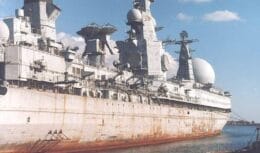
Reactivation of idled shipbuilding yards in Rio de Janeiro will generate 30 direct jobs and around 100 indirect jobs
Behold, there is hope for the Brazilian shipbuilding industry! A group of experienced professionals in the sector got together and created the Emerge Project, which proposes a revitalization of the naval sector. The idea will be presented to the Federal Government and promises to turn the page of Lava Jato, resuming work at the shipyards and, therefore, generating many job openings, including in the oil and gas sector if Petrobras starts placing orders in Brazil again.
Read also
- Shipbuilding: Petrobras signs a contract with Keppel for the construction of FPSO P-78, which will be installed in the pre-salt layer, in the Santos Basin
- Brazil's Shipbuilding Struggles to Survive! Belov Shipyard in Salvador (BA), has priority for manufacturing RSV and SDSV
- Naval industry receives more than half a billion reais to invest in vessel construction and repair projects
- Works in the naval industry of Angra dos Reis confirmed: FPSO from Teekay Offshore is on its way to the Brasfels shipyard for adaptation works, then operating under contract with Karoon Energy
Despite having excellent professionals, Brazil is currently facing a crisis in the naval sector and we have to face shipyards ready to work, but which are practically stopped and/or abandoned. The works, which could be done here, are being carried out in Singapore and Korea.
The Emerge Project comes to change this reality. The articulations began in 2019. After much study and debate, the group says it is ready for the stage of “dialogue and convincing the political class.”
“We need, somehow, to turn the page on Lava Jato. Because activity is not corrupt. It has to change that image, regain credibility”, says Reiqui Abe, graduated in Naval Mechanical Engineering in the 1970s and one of the leaders of the project.
According to Dieese, Lava Jato left 4,4 million workers unemployed in Brazil
The Lava Jato operation led to the unemployment of 4,4 million workers in Brazil, given that many work contracts were interrupted between Petrobras and contractors involved in the corruption scheme, says the researched Inter-union Department of Statistics and Socioeconomic Studies (Dieese).
The sectors most affected by the operation were oil, gas and civil construction and marine industry, which is included in this account, since the shipyards were used mainly for the repair and construction of vessels and platforms and for logistical activities related to the extraction and refining of oil.
In addition, the country would have stopped receiving R$ 172 billion in investments, of which R$ 47,4 billion would be in tax collection and R$ 20,3 billion would be for payroll contributions.
Despite Projero Emerge sounding idealistic, for the expert there is no other way out. “What is needed is to change the industrial policy of the current Federal Government. Naval activity can help a lot, creating jobs. And more: it will have to manufacture motors, pumps, and that moves the industry as a whole. We are going to sensitize the political class to create jobs and strengthen the industry through naval activity”, he says.
In the list of post-Lava Jato losses, we can mention the millions paid monthly by Petrobras to keep shipyards idle. The Inhaúma shipyard alone, in Caju, costs the Brazilian oil company R$ 5 million per month, according to information provided in off to Brazil in fact.
Brazilian Association of Onshore and Offshore Shipbuilding Engineering supports the Emerge Project
The Emerge Project was founded in 2016 by engineer Mauricio Almeida, and is currently 65 years old “and 46 on the pier”, with the support of the Brazilian Association of Onshore and Offshore Naval Construction Engineering (Abecom)
“I'm not against Lava Jato, I just think they shouldn't have taken the works out of Brazil. What is wrong is transferring 100% of the work to Asia because the shipyard executives stole it. At Renault, in Japan, the main executive was accused of theft and corruption, and there they did not close the doors preventing people from buying a car”, says Almeida.
According to the engineer, Lava Jato repeated a formula that had already produced disastrous effects in the 1980s. At the time, investigations of embezzlement at the National Superintendence of Merchant Marine (Sunaman) tarnished the sector's image and paralyzed works across Brazil.
Reactivation of idled shipyards in Rio de Janeiro will generate 30 direct jobs and around 100 indirect jobs
While Lava Jato wreaked havoc at shipyards across Brazil, Reiqui Abe says Projeto Emerge will initially focus its actions on the state of Rio de Janeiro.
The new governor Cláudio Castro (PSC), substitute for Wilson Witzel (PSC), is “responsible” for the optimism of the group, since, in his inauguration speech, he promised to dialogue with the Federal Government about job creation in the state based on the reactivation of idled shipyards.
“As in the past the core of naval activity was Rio, the idea is to start here, so that starting from this example, the Atlântico Sul Shipyard (EAS) can be reactivated, as well as the one in Rio Grande [of the company Engevix], in Bahia [ Odebrecht], and everyone else,” he explains.
According to Reiqui Abe's estimation, the fulfillment of this promise would immediately mean 30 direct jobs and almost 100 indirect jobs. “And without much investment. Because in Caju there is a ready-made shipyard. In Niterói, too”, he says. It is noteworthy that a similar effort is also taking place in the Brazil's Automotive Industry Also.
For more vacancies and news in the Port, Naval and Merchant Industry, access the NPE – Naval, Port and Shipyard.











I have an Onix LTZ 2023 2024…
I went back to SP2 and...
I have an onix plus premier 2021 car…
I want to work in other countries…
A car like this with automated transmission? AND…
I want a job as a cat D driver
Great article. 👏👏👏
I have a 1989 Monza, wonderful car…